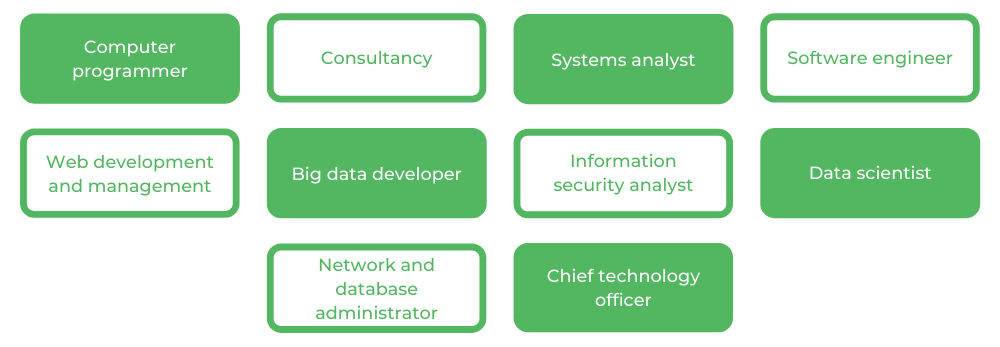So, you know what to expect from studying a Bachelor of Advanced Computing at USYD, but you want to get a personal perspective on what it’s really like?
We’ve asked Emily, a third-year Bachelor of Advanced Computing/Bachelor of Science (Physics) student at USYD, to share some more insights into the course.
Let’s get started!
Why should you study an Advanced Computing degree at USYD?
Top 3 Pros of an Advanced Computing Degree
Top 3 Cons of an Advanced Computing Degree
Mistakes You Shouldn’t Make
Things to Know Before Starting USYD Advanced Computing
What Makes this Degree Different
Motivations for Studying USYD Advanced Computing
Potential Career Paths
Why should you study an Advanced Computing degree at USYD?
Advanced Computing at USYD is a four-year degree with an embedded Honours program. This degree is also accredited by the Australian Computing Society, meaning that you’ll have the core skills that are needed to become a computing professional when you graduate!
On top of that, you’ll get to specialise in a key area of computing such as computer science, software development, computational data science, or information systems.
Top 3 Pros of an Advanced Computing degree
#1: The skills you learn
The computing industry is huge at the moment and looks like it will continue to grow, so knowing how to code, create apps, or use data to make decisions can be incredibly handy when you head into the workforce!
“They’re very relevant skills for the industry right now. And the way the industry is going, we’re all online this year because of COVID and we’ve needed programmers in the world, so they’re applicable,” Emily mentions.
#2: Combining problem solving and creativity
“You’re not just learning facts. You’re not just rote learning but you can bring creativity into it, and you’re actually creating something,” says Emily.
Working as a computing professional often mixes creativity with solving problems, and studying Advanced Computing will give you ample experience doing so.
#3: Breadth of learning
Rather than focusing solely on coding or learning specific skills, Advanced Computing at USYD exposes you to the different areas within computing. This gives you the opportunity to try new things and figure out whether you want to specialise in certain areas and determine what you want to do once you finish your degree!
Top 3 Cons of an Advanced Computing degree
#1: Heavy workload
“Some of the subjects have a huge workload,” Emily points out. Since you’ll be building apps, programming, and completing other tasks for assignments, you can expect to be putting in a lot of time and effort to get everything done.
On top of working on assignments and preparing for classes, you’ll be attending university for 20-25 hours a week, so time management is a must!
#2: Lots of assignments
Part of the reason for the high workload is the number of assignments you’ll need to do. While some subjects assess your skills in few, highly-weighted assessments, some require you to complete multiple assignments that can require just as much work.
Emily shares, “I’ve had other subjects where you’ve had to do lots of coding assignments, up to six coding assignments [across the semester] and they’re worth [5% to] 10% each.”
#3: Coding in exams
Your ability to code is primarily assessed with assignments, but some subjects can require you to write code by hand in final exams!
This is done to ensure that you can code without additional help and you do get used to it, but Emily says, “It is hard to have [in] a final exam.”
Any regrets?
Emily has no regrets studying Advanced Computing, and says “I’ve always liked coding… in the HSC, I did Software Design and Development, and it was very theoretical. But with this degree, I feel like it’s actually very practical and also very rewarding.”
What do you wish you had known before starting the degree?
#1: Start assignments early
As we’ve mentioned earlier, Advanced Computing at USYD comes with a large workload, so it’s important to give yourself enough time to complete assignments before the deadline.
#2: Get involved
Studying online during COVID has been a struggle for a lot of people, while the lack of physical social events has shown how important they are for socialising and finding friends.
“I should have spent more time at the social events in first year — I should have made the most of it,” Emily says.
For Advanced Computing students, joining SYNCS (the Sydney Computing Science Society) is a great place to meet like-minded students. During COVID, SYNCS has been hosting virtual programming contest training, social nights, and programming ‘Help Desks’ every week to help students socialise and improve their programming skills!
What makes this degree different from the ones offered at other universities?
“What I liked about [Sydney Uni] is that there’s a great variety of courses,” Emily says.
The Advanced Computing program at USYD has been designed so that students explore the different areas of computing, from computer science and information systems to software development and computational data science, before they specialise.
She adds, “You don’t have to just do coding — you can actually learn security and you learn about systems. So I think that’s what appealed to me.”
What inspired you to choose this degree?
Emily says, “I think [USYD] does have a really good reputation as well.”
“Now that I’ve done a bit of security, I would like to do more of that. And to be honest with you, when I came into the degree I wasn’t thinking about [studying that] at all, so you can get inspired.”
What are the possible career paths?
You can pursue a whole range of different careers with your Advanced Computing degree from USYD, especially because you graduate with a well-rounded skill set across the different areas of computing.
Some of these career paths include:
-
- Computer programmer
- Consultancy
- Systems analyst
- Software engineer
- Web development and management
- Big data developer
- Information security analyst
- Data scientist
- Network and database administrator
- Chief technology officer
While these career opportunities can vary depending on which major you choose, there are plenty of transferable skills that expand your options even more!
Rachel Fieldhouse is a Content Writer at Art of Smart Education and has just completed a double degree in Science and Arts at The University of Sydney, majoring in Chemistry, English, and Linguistics. Rachel’s writing has been published in Concrete Playground, Inside Enterprise, Planting Seeds, and SURG FM, and she currently writes blog posts for Remi AI, a Sydney-based Artificial Intelligence firm. When she’s not writing, you can find Rachel playing her saxophone or flute, or relaxing with some sudoku.





